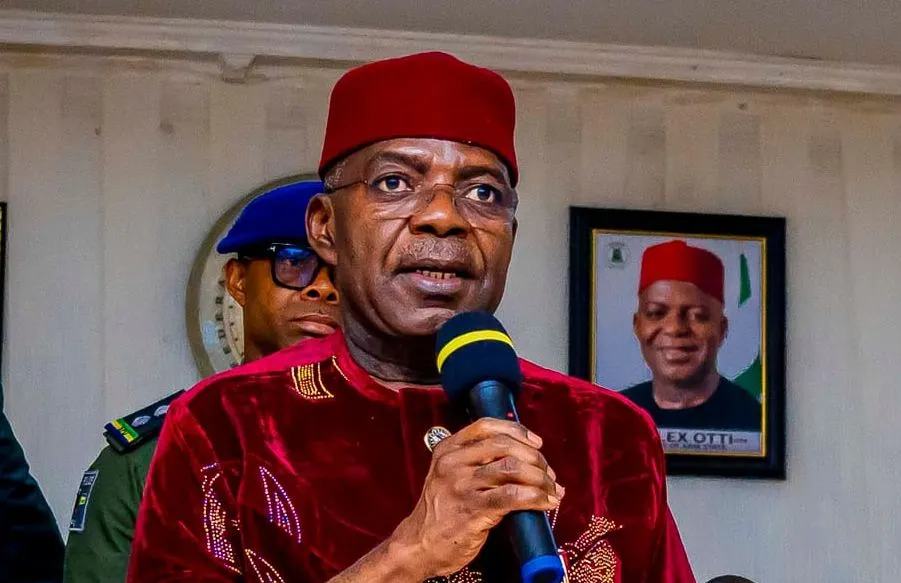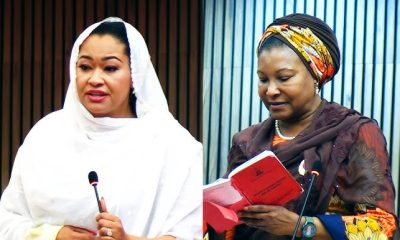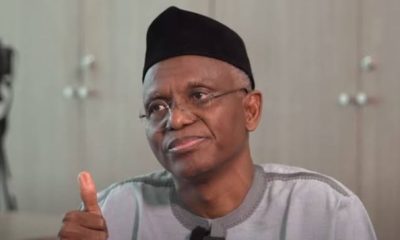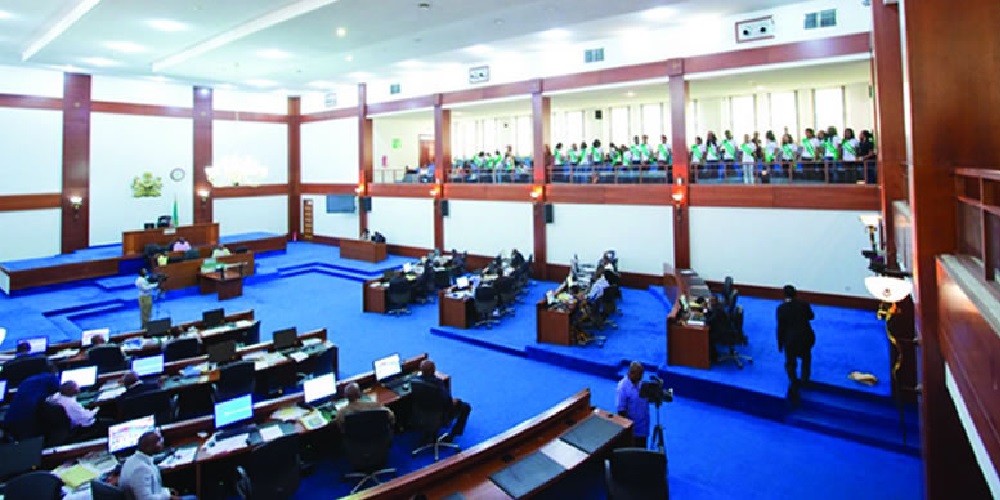News
Otti renames Abia Poly after late Onu

Gov. Alex Otti, has renamed the Abia State Polytechnic, Aba, after the first governor of the state, late Dr Ogbonnaya Onu.
Otti made the announcement on Thursday, during a Commendation Service held in honour of the deceased at the International Conference Center, Umuahia.
The News Agency of Nigeria (NAN) reports that Onu, who passed away in April at the age of 72, also served as the Minister for Science, Technology and Innovation.
The governor said that late Onu made significant contributions to the development of the state and nation at large.
“We as a state have decided to immortalize him by renaming the Abia State Polytechnic, Aba after him.
“The Polytechnic will henceforth be known as Dr Ogbonnaya Onu Polytechnic, Aba,”he said.
The governor added that the deceased made significant contributions to Abia’s development.
This, he said was especially with the founding of the Abia State Polytechnic, the Abia State College of Education (Technical), and supporting the establishment of Michael Okpara University of Agriculture (MOUAU).
“The simultaneous establishment of these institutions in the three senatorial districts of the state speaks to Dr Onu’s distinction as a strategic leader.
“He was a leader that understood the connection between institutions of learning and the development of the critical manpower necessary for holistic and widespread economic growth,” he said.
Otti recalled that late Onu’s act of patriotism in 1999 when he sacrificed his presidential bid for national unity, adding that the deceased showed great commitment to Nigeria’s future.
“He loved the country and its democratic future more than his desire to occupy the exalted seat of the presidency.
“Dr Onu was by every measure, qualified to serve this country as its president at the dawn of the Fourth Republic and had a good run at it.
“He only had to let go of his ambition when circumstances contrived against it but he still found other veritable ways of serving the country he loved so dearly.
“He was an important voice for democracy, a true nationalist and patriot who saw beyond the narrow prism of ethnicity and religion.
“He saw every Nigerian as a citizen who has the right to pursue their economic and social aspirations from any part of the country, unrestricted by individual or institutional biases,”Otti said.
He said Onu’s demise had created a social and political void that would be very difficult to fill.
Otti prayed God to grant the family of the deceased and the people of Ebonyi State the fortitude to bear the loss and urged them to emulate his life of service and integrity.
In a homily, the Bishop of Umuahia Catholic Diocese, His Lordship Michael Ukpong, emphasised the need for all to live responsibly.
Ukpong said that the former governor positively impacted lives and left indelible marks in Abia.
He said the deceased would be remembered for many reasons including contributions such as attracting the rebuilding of the Abia Tower of Peace, establishment of Broadcasting Corporation of Abia, National Ambassador among others.
The News Agency of Nigeria (NAN) reports that the event attracted dignitaries including chairman, National burial planning committee, Sen. Anyim Pius Anyim among others.
(NAN)
News
Trump declares war in Ukraine could end after productive discussions with Putin

US President Donald Trump has disclosed that the war between Russia and Ukraine could end soon.
According to Trump, this comes after productive discussions with Russian President Vladimir Putin.
Trump stated this in a post on his Truth Social, adding that he had requested that Putin spare the lives of completely surrounded Ukrainian troops.
“We had very good and productive discussions with President Vladimir Putin of Russia yesterday, and there is a very good chance that this horrible, bloody war can finally come to an end,” Trump said.
The Truth Social post did not say whether Trump and Putin had spoken to each other.
However, Kremlin spokesman Dmitry Peskov said Putin had used the meeting to convey to Trump through Witkoff.
Peskov added that Russia and the US would work out the timing of a phone call between their presidents once Witkoff had briefed Trump.
The US president has said he wants Moscow and Kyiv to agree to a swift ceasefire to pause fighting in a conflict which he has warned has the potential to spiral into World War Three and has already cost many lives on both sides.
News
MEET Nigerian born Joshua Beckford, youngest person to attend Oxford University

Joshua Beckford gained worldwide recognition as the youngest person ever to study at Oxford University.
The youngster was admitted at age six (taking part in courses which were part of an online learning platform for gifted children) and gained distinctions in both Philosophy and History.
When Beckford’s father, Knox Daniel, wrote to Oxford University advocating for his son’s admission, it was a bold move to challenge the conventional age limits for a programme aimed at children aged eight to 13.
His record remains unmatched, with the next youngest Oxford student being at least two years older at the time of admission.
By 10 months old, Beckford could already identify letters and numbers. At age two and a half, he could read fluently using phonics and had begun learning Japanese and some Mandarin.
Aspiring to become a neurosurgeon, Beckford has already demonstrated remarkable medical knowledge.
Using the Microsoft Surgery Simulator, he has mastered complex surgical procedures, including cataract removal, hernia repair and leg fracture correction. His proficiency with surgical instruments showcases his extraordinary abilities beyond his years.
Beyond medicine, Beckford is multi-talented, excelling in art, Information Technology (IT), sports and foreign languages.
In 2017, Beckford was named Positive Role Model of the Year at the UK’s National Diversity Awards.
The Illumination Foundation of North Carolina also listed him among the Top 30 Most Extraordinary People worldwide who have made societal impact.
Beckford serves as an ambassador for the Boys Mentoring Advocacy Network (BMAN), a non-governmental organisation dedicated to mentoring young boys and adolescents in Africa. Within BMAN, he holds the role of Low-Income Families Education (L.I.F.E) Support Ambassador across six countries: Nigeria, Ghana, Kenya, Uganda, South Africa and the United Kingdom where he was born.
Joshua Beckford also serves as the face of the National Autistic Society’s Black and Minority (BME) campaign. Diagnosed with high-functioning autism himself, he helps to spread the campaign’s mission.
In 2019, Beckford and his father travelled to Nigeria to launch a live mentoring session, delivering a keynote speech at the University of Lagos before an audience of nearly 5,000 people. Their visit was to raise funds for building a secondary school in Kaduna State, providing education to children from economically disadvantaged backgrounds.
According to a statement on UNILAG’s website, the proposed school was to include classrooms, an administrative block, a laboratory, an ICT Centre and an agriculture green garden and was to be named Joshua Beckford Community School.
News
Dayo Amusa opens up on alleged affair with KWAM 1

By Kayode Sanni-Arewa
Nollywood actress Dayo Amusa has opened up on alleged romance with Fuji music icon King Wasiu Ayinde Marshal, better known as K1 De Ultimate (KWAM 1).
Speaking on Oyinmomo TV, she dismissed the rumors, made it clear that what they share is far from romance.
She described their connection as one built on deep respect and unwavering support, a bond that has nothing to do with the assumptions people make when they see a man and a woman close.
Amusa spoke of K1 not just as a friend, but as a father figure, a guiding force, and an unwavering pillar in her life..
The movie star revealed how he became her silent anchor in ways she never saw coming, wiped her tears, and pushed her forward when everything seemed to be working against her especially in her movie career, where his influence and support gave her the strength to rise beyond limitations.
For Amusa, a man like that is a presence to be cherished, no matter how many times the world tries to twist the narrative.
This follows her fiery social media outburst in November 2024, where she fiercely shut down relentless speculations and invasive questions about her newborn’s father.
What began as a wave of congratulatory messages quickly spiraled into a frenzy of gossip, fueled by none other than the notorious blogger Auto Bola. The actress soon found herself at the center of a paternity storm, her joy overshadowed by whispers and relentless online probing.
Auto Bola, with her never-ending videos, refused to back down, hammering Dayo with demands to unveil her child’s father.
In her relentless pursuit of a scandal, she dragged King Wasiu Ayinde Marshal, assumed he is Amusa’s baby daddy.
-

 Politics9 hours ago
Politics9 hours agoWATCH moment Wike arrives Rivers State in grand style for Ijaw people reception
-

 News10 hours ago
News10 hours agoSenator Ireti Kingibe vows to champion sexual harassment allegation against Akpabio
-

 News10 hours ago
News10 hours ago2027: El-Rufai becomes prayer warrior, says “I pray, Obi others join opposition alliance
-

 News9 hours ago
News9 hours ago2023: El-Rufai regrets throwing his weight behind Tinubu despite all the odds against him
-

 News19 hours ago
News19 hours agoRivers lawmakers adjourns sitting indefinitely
-

 News19 hours ago
News19 hours agoHarassment: Akpabio, Natasha, others to give testimonies before Senate Cttee
-

 News4 hours ago
News4 hours agoRARE TRUTH TOLD: If I hated Ijaw there’s no way I would have supported Fubara-Wike
-

 News10 hours ago
News10 hours agoTrump plans to impose travel ban on 43 countries, including Nigeria(See list)






